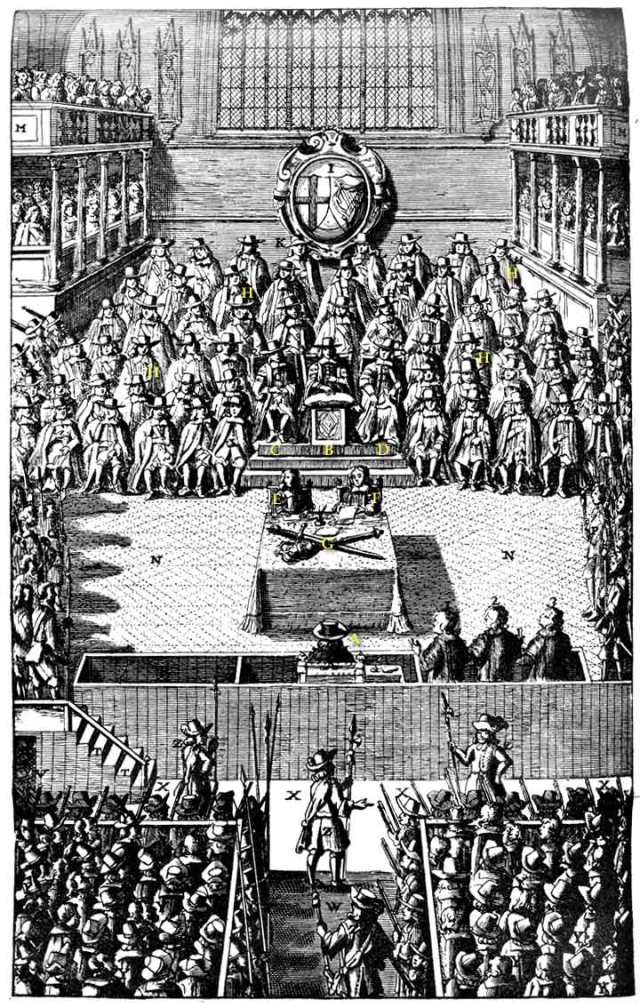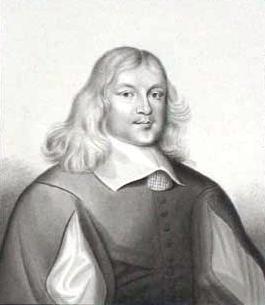
A plate depicting the Trial of Charles I in January 1649, from John Nalson’s “Record of the Trial of Charles I’ Attribution: Wikimedia Commons
With Donald Trump about to join Bill Clinton, Richard Nixon and Andrew Johnson as only the fourth President in the history of the United States to face an impeachment trial, it is perhaps unsruprising that few in America and even fewer in England are even aware that the legal precedent for such proceedings is rooted in the events of January 20th 1649, when the trial of King Charles I began at Westminster Hall. The trial itself is not only one of the landmark episodes of seventeenth century English history, with all the high drama of a contemporary television soap opera, but also of England’s constitutional history generally; in that it set in motion a chain of events that were to transform the institution of Monarchy from one of Absolutism, a state in which it had remained since the Norman Conquest of 1066 had established the Franco-Norman Ascendancy, into the Constitutional Monarchy that the United Kingdom presently enjoys.
As the media’s attention focuses on the involvement of such high flying legal personages as Ken Starr and Alan Dershowitz in the impending legal process, names such as John Bradshaw of Wyberslegh Hall, not to be confused with the New York Times bestselling author of the same name, are pretty much almost forgotten. Although this may be somewhat unsurprising, given the radical nature of the Trial of King Charles I itself, it is a sad fact indeed that so many Englishmen, and indeed Englishwomen, are completely unaware of the historical and political legacies of the events which took place in January 1649 and how they have affected our own contemporary world. This, the first ever public trial of an English monarch by his own subject people, was to be quite literally responsible not only for the bringing about of the first ever successful European Revolution, in the context of how we ourselves presently understand the term, and an event which was to turn the seventeenth century political world of the Stuarts completely upside down.
The central thrust of the trial revolved around two diametrically opposed legal arguments. The King, in conducting his own defence, demanded by what authority he had been brought to trial in the first place. His accusers on the other hand, acting on behalf of the Army Council and the Rump Parliament, were to base their case for the prosecution around Charles’s breach of what was seen by his captors as the bond of sacred trust between the Monarch and his People as manifest in the Coronation Oath that he had taken when he had ascended to the throne in 1625. The words of the Articles of Impeachment read out at the trial are clear and unambigious, and accuse the King of seeking to ‘erect and uphold in himself an unlimited and tyrannical power to rule according to his Will, and to overthrow the Rights and Liberties of the People…..’ out of what they describe as ‘a wicked design’. ‘Sir, under favour it was the Liberty, Freedom, and Laws of the Subject, that ever I…… —defended myself with Arms…..’ came the King’s response; in a defence that he and his supporters viewed as being firmly grounded in the fact that the bill enacted by the Rump Parliament on 4 January 1649, to establish the ad hoc High Court of Justice at which Charles was to be committed for trial, had never obtained the Royal Assent and therefore had no basis in law.
I began this blog post with a reference to how the present impeachment process now running its course on the other side of the Atlantic is rooted in English law. A fact openly acknowledged by the authors of a report published by the 1974 Judiciary Committee in the immediate aftermath of the Watergate Crisis and the subsequent impeachment of Richard Nixon. These facts did not go unnoticed by Benjamin Franklin, who was himself accredited by Thomas Jefferson with having penned the hoax epitaph of John Bradshaw originally attributed to an anonymous engraver resident at Jamaica, not so very far from where the some would say infamous regicide’s ashes had been subsequently interred. In view of this it is perhaps also significant that a certain John Phelps, who had served first as Clerk to the High Court that had tried the King, and later as private secretary to Oliver Cromwell, should himself have been the ancestor of a number of prominent Americans of note. These are said to have included President James A. Garfield’s 1881 appointee as Ambassador to Austria-Hungary, William Walter Phelps, and the Hon. Charles A. Phelps, M.D. of Massachusetts, who together with his kinsman commissioned the memorial to their ancestor John Phelps that can presently be found at Vevey, Switzerland, where it can still be seen.

John Bradshaw (1602-1659) Engraving after portrait by George Perfect Harding (Wikimedia Commons)
